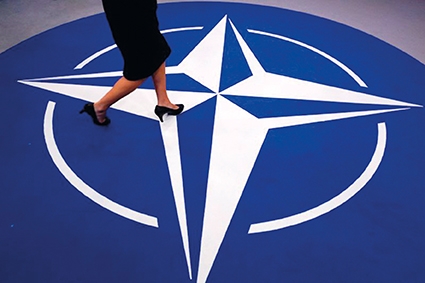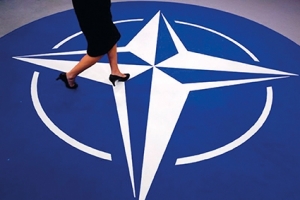NATO’s “Small Talk”
On March 26, NATO Secretary-General Jens Stoltenberg arrived in Tbilisi and met high officials, including PM Giorgi Bakhtadze and President Salome Zurabishvili. During his “blitzkrieg” visit, Stoltenberg firmly re-iterated the Alliance’s official standpoint once again: Georgia will become a member of the military bloc and Russia has no rights or power to oppose it. Yet, according to mainstream media outlets, this time Secretary-General added “very soon,” wording that offered more concrete timing and raised hopes that the so-called MAP (Membership Action Plan) will finally be granted to the small Caucasus country.
Unarguable, such high-level visits are extremely important to maintaining Georgia’s aspirations for NATO membership and, generally, to keep spirits high on the ground. But Tbilisi has been hearing such promises of commitment on a regular basis for the last decade, with visits from NATO officials having become something of an annual tradition. We can easily argue that Jens Stoltenberg’s trip to Tbilisi was another example of NATO “small talk” without real outcomes for MAP issuance, but with more serious consequences for local society and its perception of the real ongoing processes in global politics.
NATO & Democracy
NATO has little to do with democracy. The Alliance is a military bloc based on ideology and with concrete geopolitical interests; in this case, democracy is just an additional advantage. These assumptions must be made clear when it comes issuing membership. It is obvious that, according to Western democratic standards, neither Georgia nor Ukraine are actually ready to satisfy such strong requirements; to say nothing of the 2008 period when Tbilisi and Kiev hoped to get MAP and had strong support from the US government. The promise given by the Bucharest Summit Declaration to open doors for these two states in the future was clearly the result of geopolitical calculations that dealt with strengthening the Eastern flank of the bloc and bringing NATO forces closer to the Russian border.
So far, using lack of democracy in Georgia as an explanatory variable for MAP refusal is an outdated trick to avoid naming the real reasons; seemingly, the only group of people who might still trust such arguments are regular citizens.
Russia, Rights & the Black Sea Region
Despite loud claims that Russia has no rights and no powers to oppose Georgia’s integration, it actually has. Moscow’s geopolitical interests stopped Tbilisi from getting MAP in 2008 and it is the only opinion that matters when it comes to the decision-making process. Putting aside political rhetoric, Russia does not need special rights to counter NATO’s policy on the Eastern flank. Every single political actor by default has the right to protect its own political, economic and social standpoints. Thus, the Kremlin has the right to defend its national interests without being granted “permission” from the West or any other actor. What actually matters is whether Russia also has the economic and military strength to back up any protest. Even though Moscow is no match for Washington in general, the state currently possesses enough accumulated power to counter the West, especially near its borders and geopolitically important life-space. Furthermore, the Russian policy of containing NATO enlargement is perceived as crucial by the majority of society; this is not constructed by Putin’s regime but a factual given. As such, the Kremlin will do its best not to let Tbilisi or Kiev be granted Alliance membership.
Whether officially noted or not, the highest and most influential political actors in the West are well-aware of Russia’s NATO fears; additionally, Georgia’s strategic partners understand that, historically, Moscow has always been keen to fight such threats by all means necessary. That is why they are not in a hurry to give a green light for the next stage of the military bloc enlargement. Even worse, NATO representatives are unsure whether bringing the organization to the Black Sea region will actually lead to more stability and prosperity or, by intervening in the so-called Russian “zone of interest,” instead lead to a direct or indirect military clash that will destabilize the whole post-Soviet space. Today, the West, and Western European states in particular, are not ready to be involved in such dramatic processes.
Negative effects of the NATO “small talk”
While looking at NATO’s annual “small talk” in Georgia, we need to raise another issue that deals with negative consequences. First, such harsh and provocative statements by high-rank officials create and maintain false expectations and perceptions of global political processes. Georgian society is being kept in a virtual reality where Russia allegedly has no rights and powers while Tbilisi’s NATO membership issue has been stretched over a decade due to unrealistic claims of a “lack of democracy.” Secondly, NATO has been transformed into a fixed idea, an obsession that clouds the judgement of local elites and regular citizens alike, while human resources are shifted from improving domestic challenges to the desperate effort to get that MAP. People have really started to believe that once in the military Alliance, democratic institutions will appear by default and the Russian threat will simply vanish. It’s a bitter pill that at the end of the day may lead to dramatic nihilism and even to a foreign policy shift, as happened with Turkey and its European integration dreams. Ad notam, that is why all main elitist INGOs and NGOs in Georgia tried hard to put the issue of foreign policy orientation into the new constitution. This is the third possible negative outcome of a short-sighted NATO policy.
By and large, NATO Secretary-General Jens Stoltenberg’s visit to Tbilisi is important for the country to feel the Alliance’s support. But it could have been even more positive if the organization’s high-officials had held back from giving false promises and “small talk” about granting MAP to Georgia; especially using the argument that Russia has nothing to do with NATO enlargement. These assumptions mislead local elites as well as society. Georgia has achieved a respectable enough level of democracy to appeal and to start slowly becoming an inherent part of the military bloc. But this aspiration will not be satisfied unless the Kremlin stops opposing it. Moscow does not need permission to defend its national interests; moreover, it has enough strength to do so. At the same time, NATO’s annual “small talk” has significant negative outcomes for Georgia. People are being kept in a bubble of falsehood where the basic laws of global politics are abandoned; secondly, the issue itself has become so politicized that it clouds the judgement of decision-makers on the ground who put more effort into becoming a NATO member than into building democratic institutions. And finally, the absence of real outcomes of Georgian-NATO cooperation may push for more nihilism and even to a foreign policy shift.
By Archil Sikharulidze
Photo by: GEOFFROY VAN DER HASSELT / AFP












